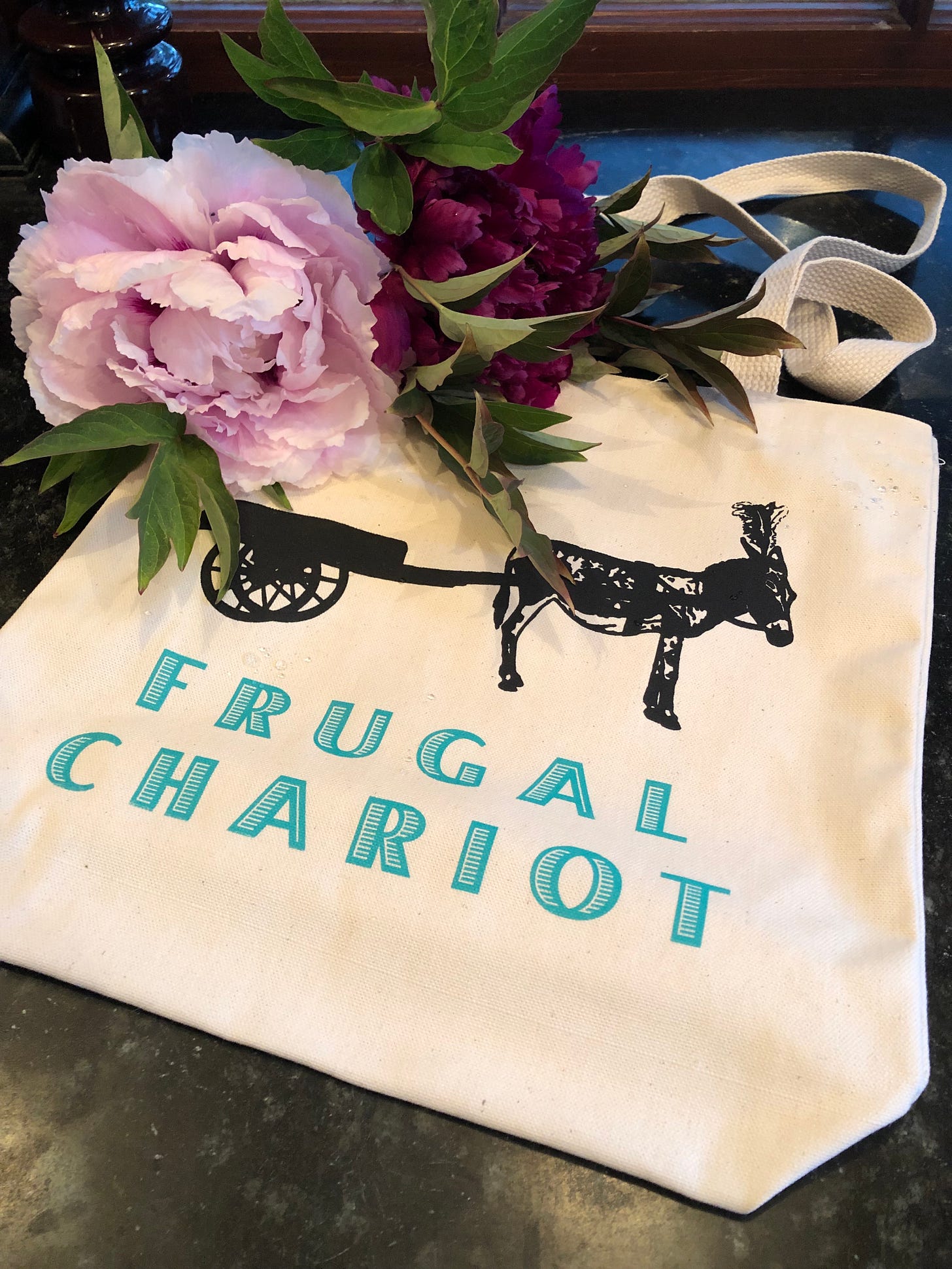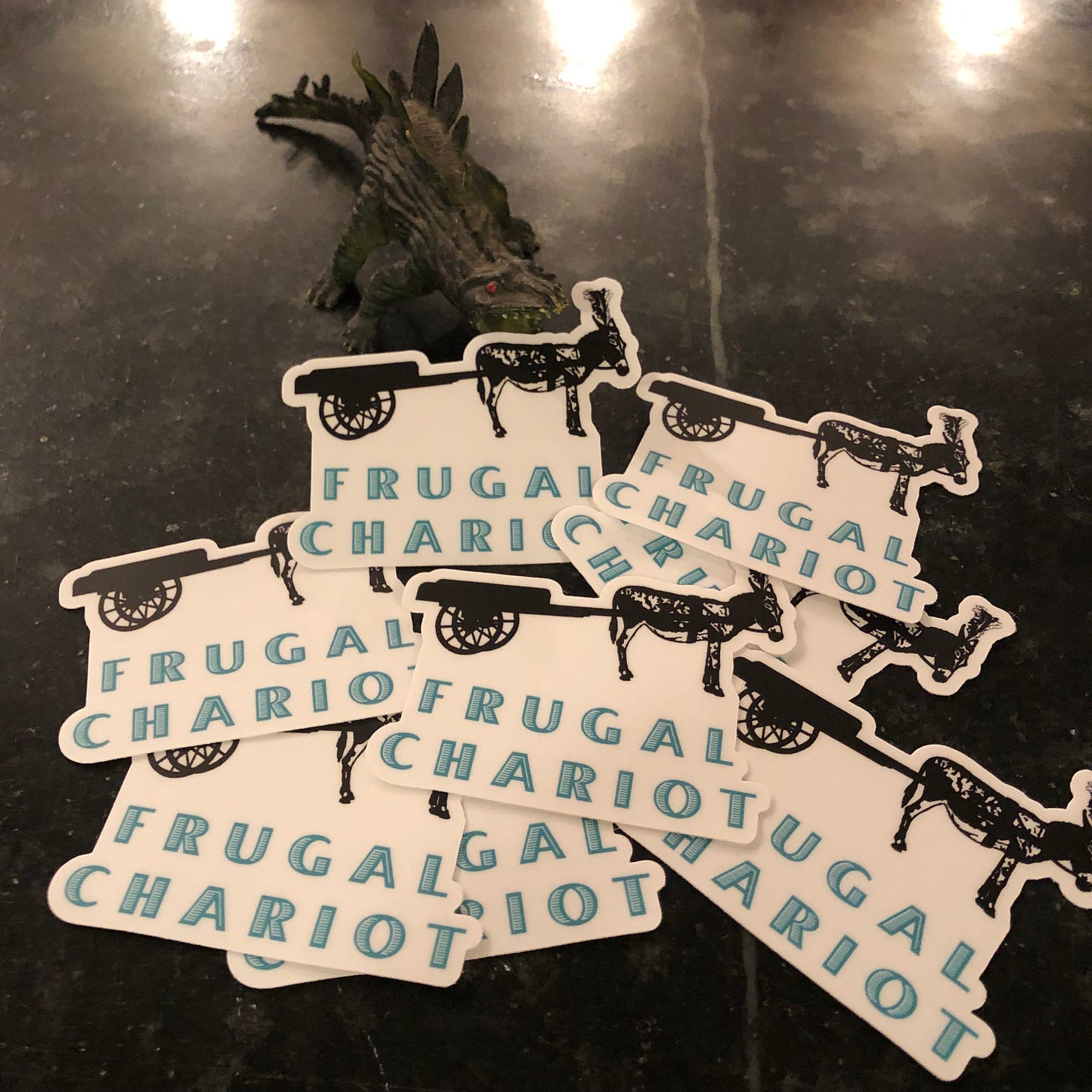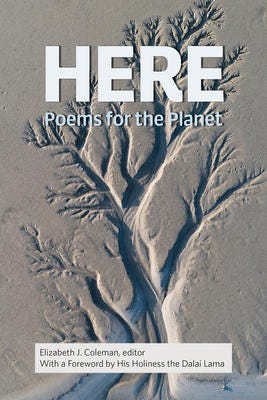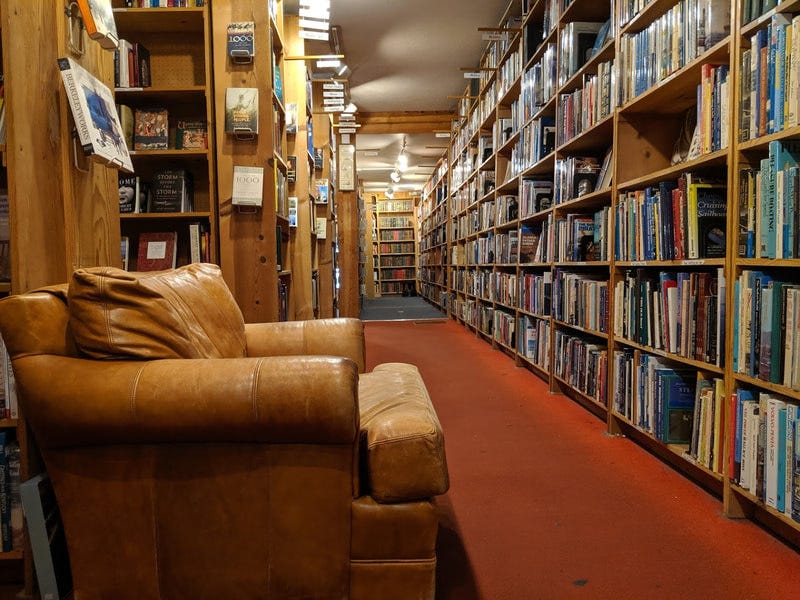Dear Reader,
After two days of coastal fog that kept the sun at bay, we have enjoyed our first truly hot day. Our garden is getting rolling, and the tree peonies have achieved escape velocity. They are as brief in bloom as they are outrageous in their beauty, so this a moment to savor.
Here are two tree peony blossoms to accessorize a happy announcement: Frugal Chariot swag is a thing! I will be sending a made-in-the-USA, 100% cotton tote bag to all founding members (and will be in touch for your mailing addresses). If you join at the Founding Member level, you too can tote with bookish pride!
I am now also prepared to send a Frugal Chariot sticker to all paid subscribers. I’ll be sending a special email about this, and you may simply reply wth your snail mail address. Thanks again to stalwart Charioteer Josiah Fisk, for pioneering donkey-cart chic with this wonderful design. Should I do T-shirts, too? Feedback welcome.
Review
Here: Poems for the Planet
Elizabeth J. Coleman, editor
Copper Canyon Press, 2019
257 pages
$18.00
The lyric poem stops time to present an offering. The reader makes a gift of attention, and receives the poem. The poem can offer to the reader a praise song, a lament, the chance to laugh, a warning, a portrait, a prayer, and many other things. A good anthology assembles a highly varied bouquet of poems, gathered via a theme that acts like a ribbon: not too loose and not too tight. Collections should feature favorites, but also present surprises. This is a good time of year for poetry anthologies, as we join together for graduations, weddings, reunions, and memorials—rites that also ask us to stop time and mark our place.
Here: Poems for the Planet is a 2019 anthology from Copper Canyon Press in Port Townsend, Washington. Copper Canyon is one of the world’s great independent publishing houses. It maintains a singular focus on poetry, and has a distinguished fifty-year history of publishing the finest ecologically-aware poets of the late 20th and early 21st centuries. Copper Canyon authors include W.S. Merwin, Jim Harrison, C.D. Wright, Ocean Vuong, Jericho Brown, Jorie Graham, and many more. Poet Elizabeth J. Coleman, who is also an artist and activist, edited this collection.
Coleman has judiciously selected 128 poems, written by a global and diverse group of poets. The book is structured in five sections, which respectively focus on poems about Earth’s beauty, poems about the perils facing the environment, poems about animals, poems by young people, and poems that offer some sort of call to ecological action. Coleman has rightly made a place for canonical works that include “The Peace of Wild Things” by Wendell Berry, “Thanks” by W.S. Merwin, “The Weighing” by Jane Hirshfield, and “Meditation at Lagunitas” by Robert Hass.
. . . There are moments when the body is as numinous as words, days that are the good flesh continuing. Such tenderness, those afternoons and evenings, saying blackberry, blackberry, blackberry.
Important newer work is also on offer in Here. Natalie Diaz, who has written some of the sexiest love poems and most haunting water poems of the century to date, is represented with the stunning lyric “How the Milky Way was Made”—which moves from the desecration of the Colorado River to the great river stars to the body of the beloved.
Just as my own mouth is dreamed to thirst the long desire-ways, the hundred-thousand-light-year roads of your wrists and thighs.
Ross Gay’s “Poem to My Child, If Ever You Shall Be” migrates from the cellular to the planetary.
. . . I wonder little bubble of unbudded capillaries, little one ever aswirl in my vascular galaxies, what you would think of this world which turns itself steadily into an obligation that hurts, and hurts bad?
Here contains work by student poets, and also concludes with a prose section on climate awareness and activism, making it an excellent gift for graduates. There is a clever abecedarian in Spanish by Selene Jazmin Venegas, entitled “Quetzalcoátal,” and a meditation on the mediating force of social media: “Snapchat Summer” by Maia Rosenfeld.
Your summer is pixellated and fleeting, When your phone runs out of memory, will you, too?
In 2020, the year after Here was published, the poet and critic Elisa Gabbert published an essay titled “Poems from the Storm,” about the now-pervasive presences of climate change in contemporary poetry. Gabbert gestures toward the idea that in the future, anthologies like these may be at once easier and more difficult to compile. “It’s not that you can’t still write a poem about sex or the rain at your mother’s funeral. It’s that sex poems and funeral poems are about climate change too.”
In the meantime, we live in a mean time in which the odds are now 50/50 that Earth will cross through the Paris Accord’s 1.5°C warming threshold—at least temporarily—within five years. As the passage of time itself becomes frightening, does the clock-stopping power of the poem become a source of respite, of clarity, of solidarity? Will the poem be the thing we still have when we have lost so much else? One thinks of Emily Dickinson, and wonders what’s to become of the meadows, the bees, the clover, our hearts.
It's all I have to bring today— This, and my heart beside— This, and my heart, and all the fields— And all the meadows wide— Be sure you count—should I forget Some one the sum could tell— This, and my heart, and all the Bees Which in the Clover dwell.
Other Voices, Other Forms
W.S. Merwin is a canonical poet of ecological awareness, and he and his wife Paula created an extraordinary arboretum at their home on Maui. Even Though the Whole World is Burning is a moving documentary tribute to Merwin’s life and work, and is available online for streaming or DVD purchase.
For Your Reading Radar
A volume of essays by Barry Lopez is being published posthumously on May 31. Embrace Fearlessly the Burning World contains pieces that stretch across Lopez’s lifetime and career, and address both his travels and his home place in Oregon. Rebecca Solnit has written the Introduction.
For Your Calendar
On Tuesday May 17 at 6 PM Central time, Robin Wall Kimmerer will be presenting at the University of Minnesota in Minneapolis, “about reciprocity, storytelling, and the interconnectedness of all beings.” She’ll be in conversation with Diane Wilson, Dakota author of The Seed Keeper. Tickets to attend in person or watch an on-demand replay are available here.
Bookshop of the Week
I have always wanted to visit Port Townsend, Washington. It’s not just the home of Copper Canyon Press, it has a historic working waterfront and is known as the wooden boat capital of the west coast. The wooden boat festival in Port Townsend is renowned worldwide. The addictive and ongoing YouTube serial Tally Ho, hosted by charismatic English craftsman Leo Goolden, centers on his restoration in Port Townsend of a classic English sailboat built in 1910. The series is doing a great job of sharing the local vibe with a global audience.
Back to books. This armchair at William James Bookseller in Port Townsend might be my first port of call. I like the cut of the owner’s jib, given that the store doesn’t open until Noon. How civilized.
The armchair looks like a local landmark, and is even featured on the bookstore’s map. It is conveniently located across from the maritime section!
That’s it for this week. xo Nicie










